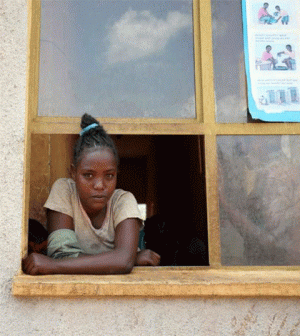- Finding Unshakable Power in a World That Wants to Pull Us ApartPosted 6 months ago
- What could a Donald Trump presidency mean for abortion rights?Posted 6 months ago
- Financial Empowerment: The Game-Changer for Women in Relationships and BeyondPosted 7 months ago
- Mental Health and Wellbeing Tips During and After PregnancyPosted 7 months ago
- Fall Renewal: Step outside your Comfort Zone & Experience Vibrant ChangePosted 7 months ago
- Women Entrepreneurs Need Support SystemsPosted 7 months ago
Hundreds of child weddings thwarted in Ethiopia as coronavirus locks girls out of schools

By Emeline Wuilbercq | Thomson Reuters Foundation
No more child brides? Ethiopia’s efforts to end child marriages could be undermined by the new coronavirus
Coronavirus is changing the world in unprecedented ways. Subscribe here for a daily briefing on how this global crisis is affecting cities, technology, approaches to climate change, and the lives of vulnerable people.
ADDIS ABABA, May 14 (Thomson Reuters Foundation) – More than 500 girls have been rescued from child marriage in northern Ethiopia since schools were shut due to the new coronavirus, a regional official said, as fears mount that the pandemic is reversing years of work to stop underage unions.
Ethiopia closed its schools in mid-March, sending 26 million children home, where girls face a greater risk of being illegally forced into marriage under the age of 18, which some human rights activists regard as a form of slavery.
Coronavirus: our latest stories
“The number is rising,” said Asnaku Deres, head of the bureau of women, children, and youth affairs in the northern region of Amhara, adding that local authorities have stopped 540 child marriages in the last two months.
“We received the tips before the wedding preparation is undertaken and were able to intervene and stop it from happening … Had not the tips come to us, these girls would have been married off,” she told the Thomson Reuters Foundation.
The U.N. predicts there could be an extra 13 million child marriages by 2030 as COVID-19 hits household incomes and stymies global efforts to end the practice.
Ethiopia is home to 15 million child brides with one of the world’s highest rates of early marriage, according to the U.N. children’s agency UNICEF, but it has been making strong progress towards its goal of ending the illegal practice by 2025.
Four in 10 girls are married before the age of 18 in Ethiopia, down from six in 10 in 2005, said Adele Khodr, UNICEF representative in Ethiopia.
“We are concerned that some of the gains that were being made for children over the past two decades by Ethiopia are going to be reversed or not sustained anymore as a result of this big crisis,” she said.
SLAVERY
Campaign group Girls Not Brides says child marriage deprives girls of education and opportunities, jeopardises their health and increases the risks of exploitation, sexual violence, domestic abuse and death in childbirth.
On average, girls in Amhara region first marry at 15 – the lowest age in the country – the latest government data shows, with high rates in poor, rural communities where sexual purity is valued and women’s main roles are as wives and mothers.
Community-based programs with elders and religious leaders, public awareness, and legal sanctions have been key to tackling child marriage, according to Asnaku.
“The practice has decreased significantly … (but) it has come to resurface again recently in some zones,” she said.
“In the previous days, we could easily get information through schools and be able to trace if the issue was happening and then be able to stop it. Now that is not possible because of the closure of the schools.”
The Australia-based Walk Free Foundation’s Global Slavery Index estimates 40 million people globally are modern day slaves, 15.4 million of whom are living in forced marriages.
Related stories
OPINION: Don’t let girls’ education be another casualty of the coronavirus
How to stop COVID-19 leaving millions of children behind in education
The hidden economic costs of child marriage
(Reporting by Emeline Wuilbercq; Editing by Katy Migiro. Please credit the Thomson Reuters Foundation, the charitable arm of Thomson Reuters, that covers the lives of people around the world who struggle to live freely or fairly. Visit http://news.trust.org)
Our Standards: The Thomson Reuters Trust Principles.






